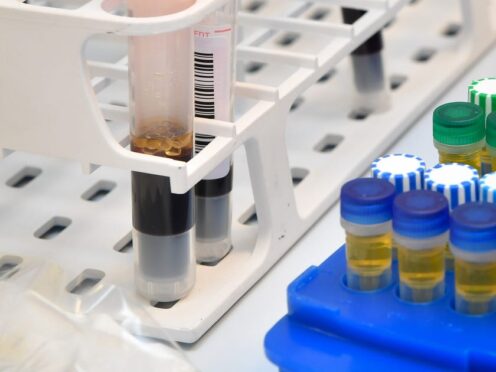A blood test that looks for changes in certain proteins could predict dementia up to 15 years before diagnosis, research suggests.
Scientists have identified 11 proteins that they say are highly accurate (more than 90%) at predicting future dementia.
These proteins, found in the liquid component of blood known as the plasma, are markers for the biological changes that happen in people who have dementia or Alzheimer’s disease.
One such protein – known as GFAP – has previously been identified as a potential biomarker in smaller studies.
The researchers from the University of Warwick and Fudan University in China described their findings, published in the journal Nature Aging, as a “breakthrough”.
Professor Jianfeng Feng, from the University of Warwick’s department of computer science, said this test “could be seamlessly integrated into the NHS and used as a screening tool by GPs”.
There are more than 944,000 people in the UK who have dementia, which is expected to rise to more than a million by 2030.
The researchers said that an early diagnosis is critical for those with the condition as there are new drugs that can slow progression of the disease if detected early enough.
Jia You, of Fudan University, said early screening “holds immense significance in pinpointing dementia risks”.
He said: “A notable advantage of plasma protein analysis is that it merely necessitates routine blood tests, similar to those conducted during regular hospital visits or health checks.
“This simplicity offers a considerable edge over more invasive procedures like lumbar punctures, especially where the targeting population are healthy individuals.”
For the study, thought to be the largest of its kind, the researchers looked at data from more than 50,000 healthy people from UK Biobank, which holds medical and lifestyle records of more than half a million Britons.
They analysed the blood samples from this group collected between 2006 and 2010.
Over a follow-up period of 10 to 15 years, more than 1,400 people went on to develop dementia.
By analysing more than 1,400 different proteins in the blood and using artificial intelligence, the researchers found 11 proteins that could accurately predict dementia up to 15 years before diagnosis.
Commenting on the study, Dr Richard Oakley, associate director of research and innovation at Alzheimer’s Society, said: “This research looked at proteins in the blood of healthy individuals and followed them up 15 years later and found a common set of proteins in those that went on to develop dementia.
“It’s very early days and lots more work is needed but this could lay the groundwork for the early prediction of dementia and teach us more about how to provide an early and accurate diagnosis.
“What we need now are blood tests that work in a real-world setting and that can accurately diagnose dementia when someone is starting to show symptoms.
“This is why we’re working with Alzheimer’s Research UK on the Blood Biomarker Challenge which will revolutionise the way dementia is diagnosed.
“The project, which is possible thanks to £5 million in funding raised by players of People’s Postcode Lottery, will gather the information needed to introduce a blood test for dementia into UK healthcare systems.”
Dr Sheona Scales, director of research at Alzheimer’s Research UK, added: “We have seen some fantastic progress in the development of blood tests for Alzheimer’s over the last few months.
“This new study adds to the growing body of evidence that looking at levels of certain proteins in the blood of healthy people could accurately predict dementia before symptoms develop.
“Further studies are needed to understand how these tests and predictive models work with data from more diverse populations.
“The key proteins hallmarks of Alzheimer’s disease – amyloid and tau – also were not included in the analysis, so we don’t know how these proteins would affect the prediction model.
“And, even when tests show promise in studies like this, they still need to go through regulatory approval before they can be used in a healthcare setting.”
